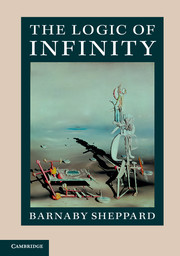Book contents
- Frontmatter
- Contents
- Preface
- Synopsis
- 1 Introduction
- 2 Logical foundations
- 3 Avoiding Russell's paradox
- 4 Further axioms
- 5 Relations and order
- 6 Ordinal numbers and the Axiom of Infinity
- 7 Infinite arithmetic
- 8 Cardinal numbers
- 9 The Axiom of Choice and the Continuum Hypothesis
- 10 Models
- 11 From Gödel to Cohen
- A Peano Arithmetic
- B Zermelo–Fraenkel set theory
- C Gödel's Incompleteness Theorems
- Bibliography
- Index
- Frontmatter
- Contents
- Preface
- Synopsis
- 1 Introduction
- 2 Logical foundations
- 3 Avoiding Russell's paradox
- 4 Further axioms
- 5 Relations and order
- 6 Ordinal numbers and the Axiom of Infinity
- 7 Infinite arithmetic
- 8 Cardinal numbers
- 9 The Axiom of Choice and the Continuum Hypothesis
- 10 Models
- 11 From Gödel to Cohen
- A Peano Arithmetic
- B Zermelo–Fraenkel set theory
- C Gödel's Incompleteness Theorems
- Bibliography
- Index
Summary
No other question has ever moved so profoundly the spirit of man; no other idea has so fruitfully stimulated his intellect; yet no other concept stands in greater need of clarification than that of the infinite.
–David HilbertIn the later years of the nineteenth century Georg Cantor discovered that there are different sizes of infinity. What had begun as the study of a concrete problem concerning the convergence of trigonometric series had turned into something far more profound. Further investigation led Cantor to a new theory of the infinite and the mathematical community stood with a mixture of bewilderment and disbelief before an unfamiliar universe. This theory was refined and developed, and continues to this day as axiomatic set theory. The theory of sets is a body of work that I feel should be known to a much wider audience than the mathematicians and mathematical philosophers who hold it in such high esteem.
This book is about the concepts which lie at the logical foundations of mathematics, including the rigorous notions of infinity born in the ground-breaking work of Cantor. It has been my intention to make the heroes of the book the ideas themselves rather than the multitude of mathematicians who developed them, so the treatment is deliberately sparse on biographical information, and on lengthy technical arguments. The aim is to convey the big ideas, to advertise the theory, leaving the enthused to seek further details in what is now a vast literature.
- Type
- Chapter
- Information
- The Logic of Infinity , pp. xi - xviPublisher: Cambridge University PressPrint publication year: 2014



